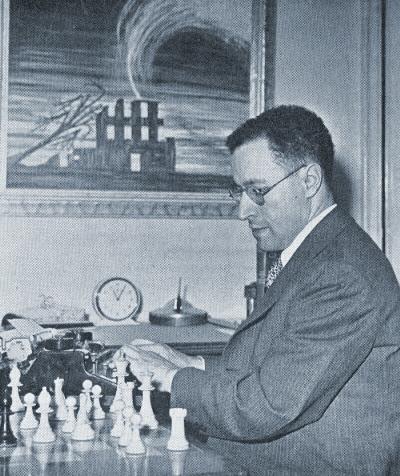
Edward Winter

Anthony Edward Santasiere
It is not widely known, but Marshall died on his way to play Bingo, wearing clean underwear. This is just one divulgation to be found in Essay on Chess by Anthony E. Santasiere (Dallas, 1972), a book that we have only just come across, and wish we hadn’t. It is, loosely speaking, a plea for tactical, rather than positional, chess (‘The Queen’s Gambit is neither a gambit nor an honor to any Queen. It is like a piece of dead flesh kept overlong on ice’) by a Believer who makes sure we know it. We have rarely read so many foolish judgements within such a short space.
Lasker (page 21): ‘If he really loved anyone or anything, it was probably himself (I knew him well, was his friend the last two years of his life – he was no longer a lion, had softened, mellowed and – I felt – then understood and was capable of love).’
‘Now Capablanca! the great Capablanca (how well he knew it!), the perfect machine, the fiery temperment [sic] with, especially in his prime, the cold, selfish heart, the incredible insane conceit – Capablanca.’ (page 23).
‘Tarrasch was a egotist, a self-made Prussian God.’ ... ‘He was bankrupt spiritually.’ (page 23).
Page 24 (Capablanca again): ‘But as he grew older there was a sad downtrend (unlike, for instance, Lasker of [sic] Mieses). The weakening was more spiritual in nature than physical, though I believe that in his prime he was insane – i.e., incapable of recognizing an equal competitor ...’ ...‘There never was or will be an egotist quite so extreme as Capablanca’ ... ‘Through him we see clearly that the anti-artist, the anti-Christ, ends only with ashes, dust!’
After all that, the reader dreads what ‘punishment’ Alekhine will take, but the result is a surprise: the author likes Alekhine (despite his adherence to the Queen’s Gambit): ‘Spiritually, out of many sufferings bravely borne, he had patient endurance, humility, courage’ (page 26).
Elsewhere we read of Chigorin’s ‘vanity’ and Herman Steiner’s ‘colossal egotism’ (page 31) and that Rossolimo ‘had been temporarily insane’ (page 43).
This is not an essay on chess, it is the prejudiced rambling of an apparently cultured man who, nevertheless, was gravely deficient in common sense. Once the sub-Fine psychology peters out, our author descends to the usual old chess anecdotes, a minimum effort being made to string them together in any logical order. It is a wretched book.
Anthony Edward Santasiere was born on 9 December 1904 and died in Hollywood, Florida on 13 January 1977 (although his death was not widely publicized).
(671)
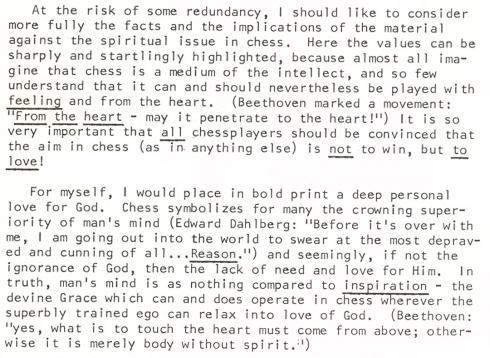
From page 8 of Essay on Chess
As in other cases, the text had originally appeared in Chess Life (page 5 of the 5 May 1960 issue). For Essay on Chess it was amended, insufficiently.
From Anthony Saidy (Santa Monica, CA, USA):
‘It is true that Santasiere wrote badly, wrote poetry that was embarrassing, had extreme views – yet, carving out a niche as our most flamboyant contemporary romantic, he was unique. He was important as an antidote. My early Marshall C.C. games with him were among my most instructive. As late as the Canadian Open, 1960 (which I won with many uneasy moments) he was able to run up to me and exclaim about a pretty but simple knight sacrifice he’d just played, “I’ve just won the most beautiful game of my life”. He really believed it at that moment. A true lover of chess – a type seldom found among top competitors today.’
(762)
Hugh Myers (Davenport, IA, USA) writes:
‘Fine's “dictum” is as unreliable as most Fine “dicta”. I could name other well-known masters. But it’s probably true that homosexuality is less common among strong players than among the general population. A researcher, Dr Hier (Michael Reese Hospital, Chicago), attributes relative weakness in judging spatial relationships to women and to homosexuals (not all of them) due to having less androgen (a hormone), and that could be the answer to the old question as to why there are relatively few female players. I told Dr Hier that I wish someone would check the androgen levels of women in Soviet Georgia! As for Santasiere, my opinion of his games (gambits without attacks) and of his writing corresponds to yours.’
(802)
The game below features A.E. Santasiere’s full set of annotations, from page 99 of the November-December 1943 American Chess Bulletin. It will be a stoic reader who manages to go through the notes without flinching, cringing or sniggering.
Edward Schuyler Jackson – Ariel Mengarini
New York, November 1943
Ruy López1 e4 e5 2 Nf3 Nc6 3 Bb5 a6 4 Bxc6 (‘This penny-pinching move has deservedly fallen out of favor.’) 4…dxc6 5 Nc3 Bc5 (‘An enterprising continuation, but 5…f6 is more promising.’) 6 d3 (‘Not 6 Nxe5 because of 6…Bxf2+ and 7…Qd4+.’) 6…Qe7 7 h3
(‘7…Bg4 need not at all have been prevented, since 8 Be3 is a good counter. In his choice of opening variation, and particularly in this ultra-cautious text, Jackson reveals his spiritual outlook for this game – fearfully conservative.
And he, especially, is always so brave, so fearless; it is the one quality in his play that has commanded our love. This only proves that when the moment is crucial enough, when it hits our tenderest desires, we become afraid! Of what? (We’ll be a long time dead and forgotten.)
Are we afraid of ourselves? (isn’t that silly?); or afraid for our little reputation? I know what it is, for I, too, have been afraid; in fact, my whole life has been a struggle against fear. And it is because I have come finally to realize true values, that I dare talk at all. Suffering either makes us or breaks us.
The Bible tells us “to lose ourselves”. Rousseau said he had never begun to live, until he had given up all hope of living! That, too, has been my experience. One can get away from our terribly important ego; one can let loose - and it makes for wonderful Godlike living.
Fear is part and parcel of vanity – dark, selfish, negative. It is worth any effort, any suffering to learn the true meaning of love in the highest (i.e., God, ideals), for then we are really free – really fearless; we depend not on ourselves, but on something (Universal – Spirit – Force) better and stronger than ourselves. In the cause of love and courage, we are even willing to die in the body. Then truly, do we deserve to live! Think for a moment of Lincoln, of Joan of Arc, of Jesus.’)
7…Nf6 8 O-O Bd7 9 Qe2 h6 (‘Preparing the following attack.’) 10 Be3 g5 11 Nh2 O-O-O 12 Bxc5 Qxc5 13 Qe3 Qb6 14 Na4 Qd4 15 Nf3 (‘A miscalculation which loses the game. After 15 Qxd4 exd4 16 Nc5, White would have at least an even game. Further comment is not necessary.’) 15…Qxa4 16 Qa7 Be6 17 Nxe5 Nd7 18 b3 Qb5 19 Nc4 a5 20 Nxa5 Qb6 21 Qa8+ Nb8 22 Nc4 Qa6 23 Qxa6 Nxa6 24 f4 gxf4 25 Rxf4 Rdg8 26 Kh2 Rg5 27 a3 Rhg8 28 Ne3 c5 29 g4 Nb8 30 Raf1 Nc6 31 R1f2 Nd4 32 b4 cxb4 33 axb4 Nc6 34 c3 Ne5 35 Rd2 h5 36 d4 Ng6 37 Rf6 hxg4 38 Rg2 Nh4 39 Rg3 Nf3+ 40 Kh1 Nd2 41 Rf4 gxh3 42 Rxg5 Rxg5 43 d5 Bd7 44 Rxf7 b5 45 Rf8+ Kb7 46 Rf4 Rg3 47 Nf1 Rf3 48 Rxf3 Nxf3 49 Ne3 Kc8 50 c4 bxc4 51 Nxc4 Bb5 52 Ne3 Kd8 53 e5 Nxe5 54 Kh2 Bd7 55 Kg3 Ke7 56 b5 Kd6 57 Kh2 Ng4+ 58 White resigns.
(2639)
Readers have been spared a sample of Santasiere’s poetry for long enough, so we now turn to pages 24-25 of The Year Book of the United States Chess Federation 1944, which published ‘Brave Heart’, Santasiere’s tribute to Frank J. Marshall. Written in August 1942 for Marshall’s 65th birthday, it began:
Brave Heart –
We salute you!
Knowing neither gain nor loss,
Nor fear, nor hate –;
But only this –
To fight – to fight –
And to love.’
Santasiere then gushes on in a similar vein for another 40 lines or so, and we pick up the encomium for its final verse:
For this – dear Frank –
We thank you.
For this – dear Frank –
We love you!
Brave heart –
Brave heart –
We love you!’
(2967)
For unclear reasons, similar verse appeared, with no mention of Marshall, on page 6 of Santasiere’s posthumous book My Love Affair With Tchigorin (Dallas, 1995).
C.N. 2967 discussed the poetry of Santasiere, quoting a clemently brief sample. It may be added that page 3 of his book Essay on Chess stated that among his output ‘there are three volumes of poetry; one of essays’. On page 160 of the March 1977 Chess Life & Review Santasiere’s obituary contained the assertion ‘at least three volumes of verse’. Have any readers seen them?
(4530)
From a biographical note on page 125 of My Love Affair With Tchigorin:
‘Never content with what he considered his imperfections, he became a recognized author. There are three volumes of poetry; one of essays, Materialism Moribund; a long story for children, Zig-Zag, a novel and three chess books.’
Corroboration of these statements is sought.
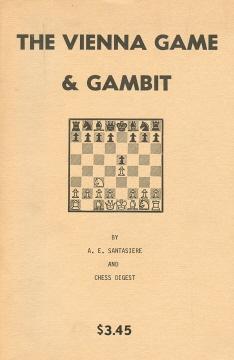
Leafing through The Vienna Game & Gambit by A.E. Santasiere and Chess Digest (Dallas, 1974), we became acquainted with such players as Bodin, Bogatzrtschuk, Bogolgubov, Charovsek, Golombeck, Hampoe, Hartson, Mettner, O’Kelley, Pincus, Polugaousky, Schallop, Schiffeis, Spielman, Stork, Sxabo and Weenimk. There are also instances of Adam’s, Barne’s and Schiffer’s, as well as the places Barman, Cortmund and Edinburg. Page 14 refers to a game between Mieses and Chigorin whose occasion was ‘Monte Car10 1002’, and page 70 discusses the game ‘Alekhine and Nenarokov-Bernsten and Blumfield, Moscow 1964’.
(6240)
From pages 4-5 of the posthumous book My Love Affair With Tchigorin by A.E. Santasiere (Dallas, 1995):
‘Only a lover of the hero should be privileged to write this book, for Love calls unto Love.
My love affair with Tchigorin began when I carefully studied his monumental 22-game match with Dr Tarrasch ... Tchigorin was the great creative artist, the poet who craved only freedom to dream. He also was a great teacher of and for what he believed in. He was so much a lover, that I truly believe that in the world of chess, he was a saint.’
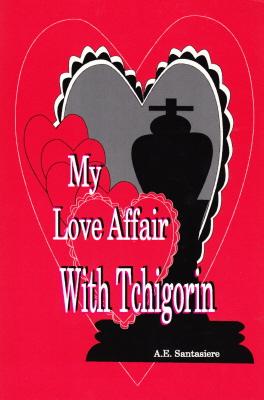
The 100 cursorily annotated games include two (games 54 and 71) in which Black is named as ‘Beratende’. This misapprehension is familiar from page 135 of Modern Chess Strategy by L. Pachman (London, 1963), translated by Alan S. Russell, where a game was headed ‘Beratende-Nimzowitsch (1921)’. Beratende is a German word for consultants/allies.
(7933)
From a ‘Chess Movies’ article on the inside front cover of the January 1959 Chess Review:
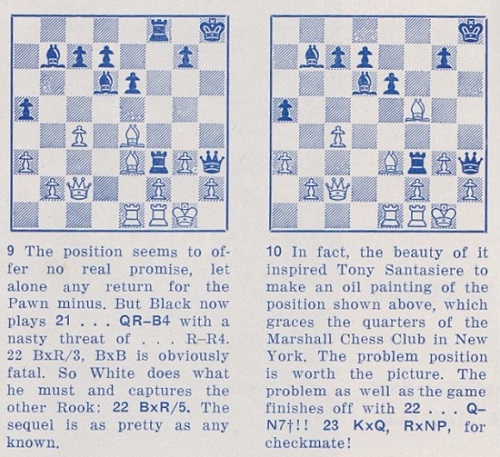
Concerning the painting by Santasiere depicting the game in question, A Brilliancy by Hermann Helms, Ronald Young (Bronx, NY, USA) reports that he saw the picture hanging in the Marshall Chess Club in 2003 and noted that the position reproduced was not precise. He asks whether a photograph can be obtained.
We are grateful to Frank Brady (New York, NY, USA) for taking the following photograph of the painting, which is still in the Marshall Chess Club’s possession:
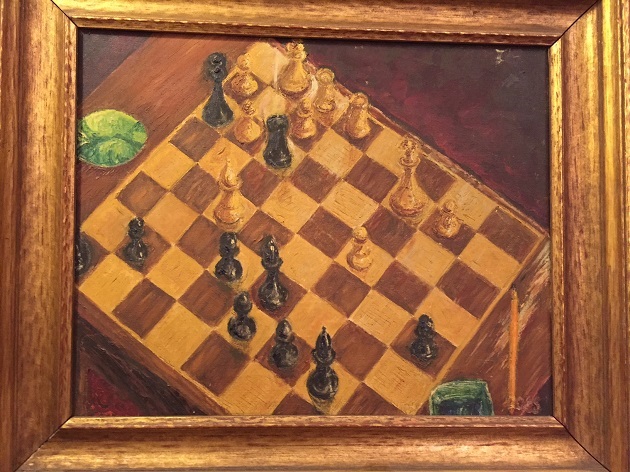
This position is from a game between Howard D. Grossman and Donald MacMurray in the New York State Championship, published on page 75 of the July-August 1938 American Chess Bulletin:
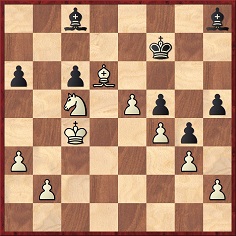
Black played 42...Bg7, which occasioned this idiosyncratic note from Anthony E. Santasiere:
‘Did ever you see two bishops so impotent? – it’s a good thing that Janowsky did not live to see it – you know, he did have a violent temper!’
(10766)
A complete game annotated by Santasiere is shown here from pages 108-109 of the November-December 1940 American Chess Bulletin:
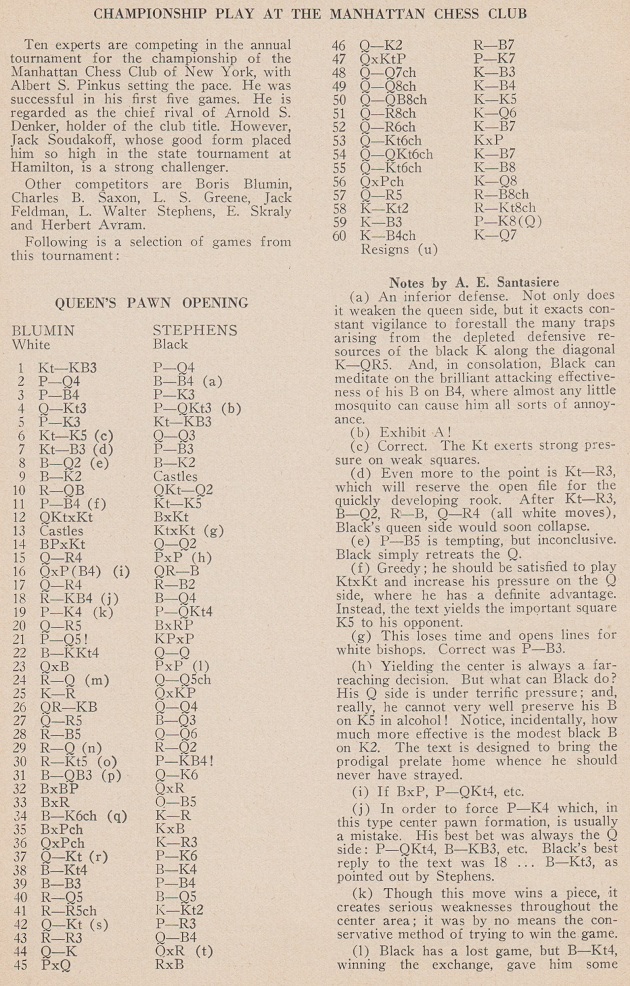
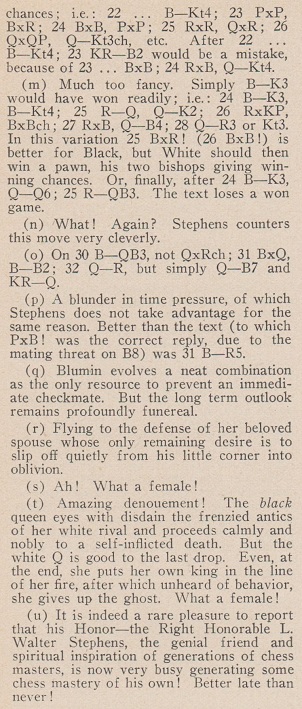
1 Nf3 d5 2 d4 Bf5 3 c4 e6 4 Qb3 b6 5 e3 Nf6 6 Ne5 Qd6 7 Nc3 c6 8 Bd2 Be7 9 Be2 O-O 10 Rc1 Nbd7 11 f4 Ne4 12 Nxe4 Bxe4 13 O-O Nxe5 14 fxe5 Qd7 15 Qa4 dxc4 16 Qxc4 Rac8 17 Qa4 Rc7 18 Rf4 Bd5
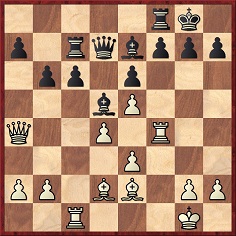
19 e4 b5 20 Qa5 Bxa2 21 d5 exd5 22 Bg4 Qd8 23 Qxa2 dxe4 24 Rd1 Qd4+ 25 Kh1 Qxe5 26 Rdf1 Qd5 27 Qa5 Bd6 28 Rf5 Qd3 29 Rd1 Rd7 30 Rg5 f5 31 Bc3 Qe3 32 Bxf5 Qxg5 33 Bxd7 Qf4 34 Be6+ Kh8
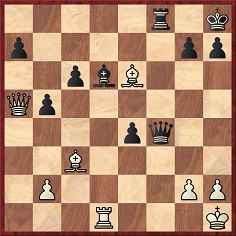
35 Bxg7+ Kxg7 36 Qxa7+ Kh6 37 Qg1 e3 38 Bg4 Be5 39 Bf3 c5 40 Rd5 Bd4 41 Rh5+ Kg7 42 Qb1 h6 43 Rh3 Qf5 44 Qe1
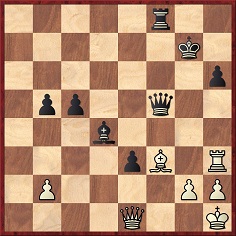
44...Qxh3 45 gxh3 Rxf3 46 Qe2 Rf2 47 Qxb5 e2 48 Qd7+ Kf6 49 Qd8+ Kf5 50 Qc8+ Ke4 51 Qa8+ Kd3 52 Qa6+ Kc2 53 Qg6+ Kxb2 54 Qb6+ Kc2 55 Qg6+ Kc1 56 Qxh6+ Kd1 57 Qh5
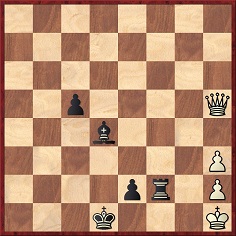
57...Rf1+ 58 Kg2 Rg1+ 59 Kf3 e1(Q) 60 Kf4+ Kd2 61 White resigns.
From page 9 of the January 1941 American Chess Bulletin:
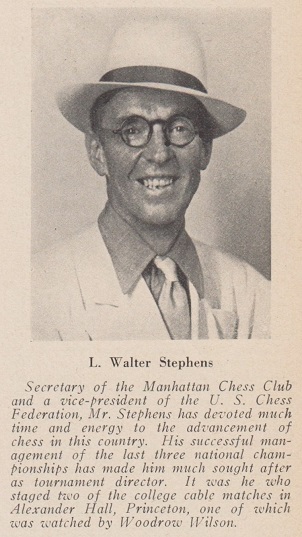
See too page 116 of the May 1941 Chess Review, which had a biographical note on Stephens, a photograph of him and his win over Blumin.
(10767)
On the subject of chess punctuation, three exclamation marks at move two were awarded by Reuben Fine on page 58 of Chess Marches On! (New York, 1945):
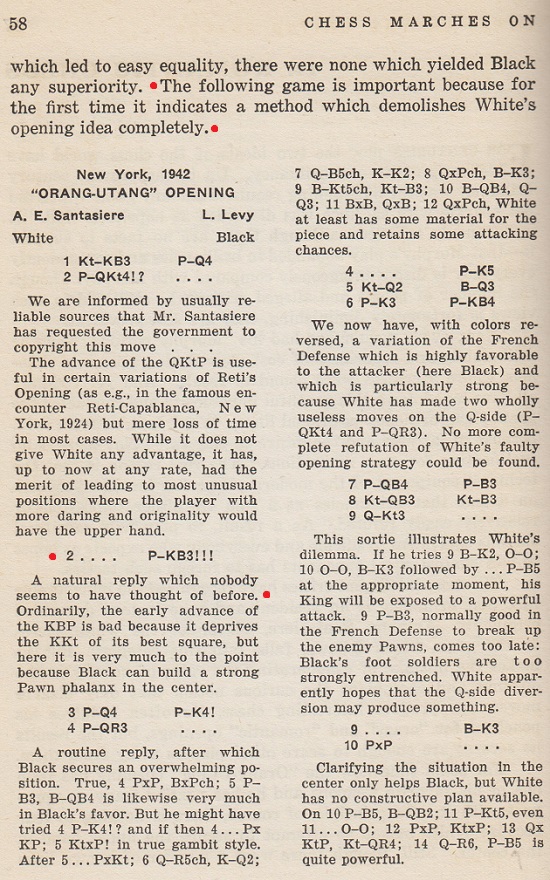
When Fine’s annotations had appeared on pages 8-10 of the January 1942 Chess Review, 2...f6 received only two exclamation marks.
The date ‘1942’ is an error. Eduardo Bauzá Mercére (New York, NY, USA) notes this report on page 17 of the Brooklyn Daily Eagle, 15 December 1941:
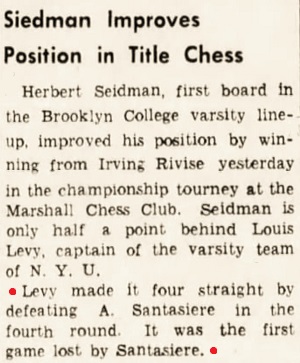
Fine was also incorrect to state that nobody seemed to have thought of 2...f6 before Levy played it in that game. Databases have a loss by Santasiere to Harry Fajans, which, Mr Bauzá Mercére points out, was annotated by Santasiere on page 14 of the January-February 1941 American Chess Bulletin:
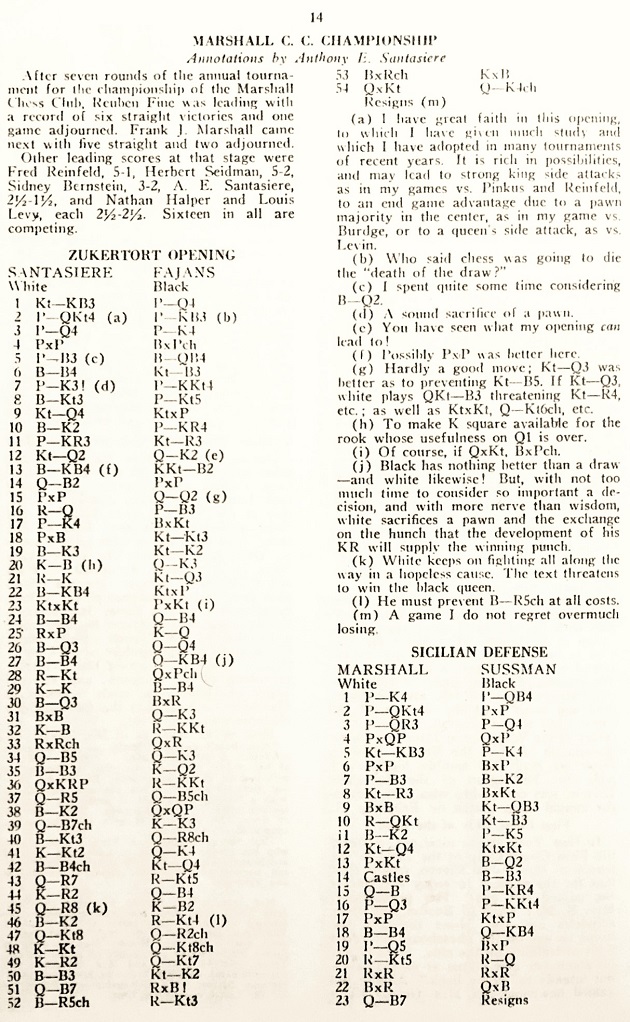
Our correspondent adds that a report on the tournament, the Marshall Chess Club Championship, on page 21 of the New York Times, 13 January 1941 recorded that the Santasiere v Fajans game had been adjourned. He refers too to page 195 of the October 1942 Chess Review, where Edward Lasker annotated a win over Santasiere with 2...f6 in the New York State Championship in Cazenovia, August 1942. The first note mentioned Fine’s January 1942 article.
To the Chess Notes main page.
To the Archives for other feature articles.
Copyright: Edward Winter. All rights reserved.